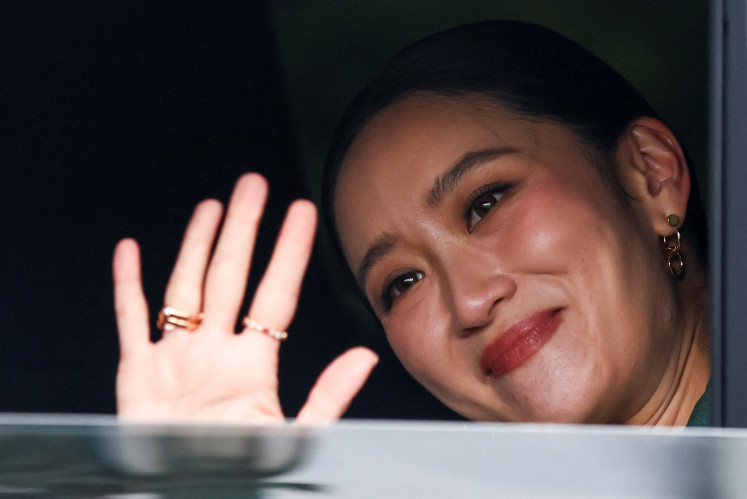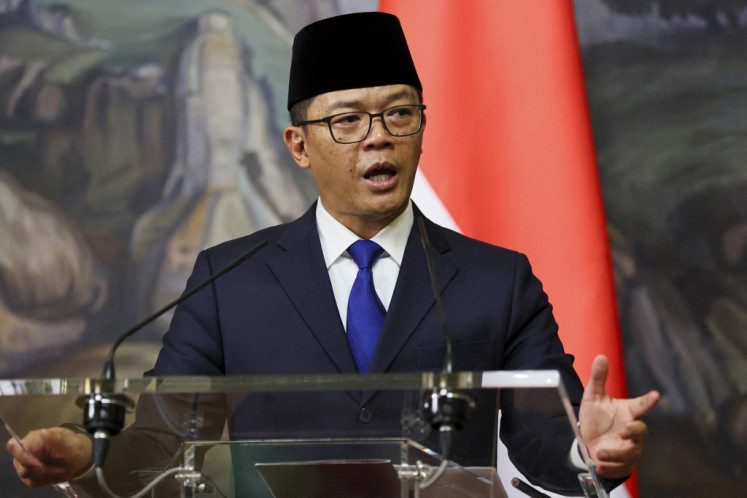Popular Reads
Top Results
Can't find what you're looking for?
View all search resultsPopular Reads
Top Results
Can't find what you're looking for?
View all search resultsPresident Jokowi and RI'China relations
China is the first official overseas visit for President Joko âJokowiâ Widodo, who has requested Chinaâs increasing involvement in the countryâs infrastructure development, particularly in the maritime sector
Change text size
Gift Premium Articles
to Anyone

C
hina is the first official overseas visit for President Joko 'Jokowi' Widodo, who has requested China's increasing involvement in the country's infrastructure development, particularly in the maritime sector.
So far, relations between Indonesia and the China have tended toward more cooperation for mutual benefit. Right after independence, in 1949 Indonesia opened diplomatic relations with China. Under first president Sukarno, Indonesia's friendly ties with China were a top priority. Liu Hong, in a book titled The Chinese and The Shaping of Indonesia, 1949-1965, reveals that China was like a lighthouse, pointing the way to how Indonesia should develop.
Sukarno's rule was dubbed the honeymoon period for Indonesia'China relations. The two countries formed a partnership on building solidarity among nations, which were then called the 'new emerging forces'.
Former president Soeharto froze relations with China in the wake of political upheaval blamed on the banned Indonesian Communist Party. However, he finally normalized relations with China in the early 1990s, a policy that was very valuable for China, which was then shunned by the West after the events of Tiananmen. The policy cannot be separated from the tremendous economic development of the two countries.
Indonesia has now witnessed the country of the 'bamboo curtain' become the world's second largest economy. According to the late sinologist, I. Wibowo, Indonesia then continued to make an effort to 'embrace China', which was also the title of a 2009 book he edited.
Since the 1990s, Indonesia's leadership has clearly shown an understanding of the importance of friendly relations with China. Then president Abdurrahman 'Gus Dur' Wahid proposed the Jakarta - Beijing - New Delhi axis as a response to the strategic value of China in the Indonesian diplomacy mandala. An icon of intimacy in Indonesia'China relations was also reflected in then president Megawati Soekarnoputri's 'dancing diplomacy'.
Under sixth president Susilo Bambang Yudhoyono, Indonesia reached a higher level of relations with China. It signed two important agreements ' the Strategic Partnership (2005), later upgraded to the Comprehensive Strategic Partnership (2013). Political, economic and socio-cultural relations continued to increase due to intensive interaction among residents, business groups and the two governments.
In her first press conference as the country's top diplomat, Foreign Minister Retno LP Marsudi introduced a number of central elements in Indonesian diplomacy under President Jokowi: a diplomacy that is resolute and dignified, pro-people and grounded in public interest.
Can the principle of mutual benefit that characterizes Indonesia-China ties be maintained within this frame? A few sectors of cooperation can be continued between the two countries.
The first is maritime cooperation. President Jokowi's vision to make Indonesia the 'world's maritime fulcrum' is congruent with President Xi Jinping's plan to build a New Maritime Silk Road. Chinese officials and analysts have often explained that the plan aims to strengthen maritime connectivity and enhance the capacity of countries in Southeast Asia to maximize security and the management of maritime resources. The policy supports Indonesia's infrastructure development efforts to support maritime connectivity.
The second sector is cooperation to maintain regional stability. This deeply sensitive issue is associated with current territorial disputes in the South China Sea. In the presidential debates during the campaign, Jokowi underlined the position of Indonesia as a non-claimant state in the South China Sea region, as later confirmed by former foreign minister Marty Natalegawa.
There is no doubt that Indonesia should take an active role in resolving the dispute, for the sake of contributing to territorial dispute management. The dynamics of the peaceful settlement of disputes in the South China Sea cannot be built without involving Indonesia.
The role and cooperative attitude of Indonesia will be very meaningful to the Chinese, who have publicly expressed commitment to 'peacefully' resolving the dispute through dialogue.
The third sector is cooperation to improve people-to-people contacts. Today, international relations is best captured by the concept of 'grounded diplomacy' by President Jokowi.
Although main foreign policy conduct remains the territory of the bureaucrats, the public has now become a major shareholder that can significantly affect the manufacturing and implementation of foreign policy.
Cross-country relationships between communities will determine the dynamics of Indonesia-China ties. Interaction between people is not simply about tourism but about networking between academics, youth activists, artists and religious groups. For more than 30 years, the citizens of both countries learned to be mutually suspicious, seeing each other as a threat due to the freezing of bilateral relations under Soeharto. Therefore, the two sides need to increase interaction and exchange between their people.
China today offers a variety of opportunities in the new diplomatic platform of President Jokowi who has determined that the conduct of foreign policy should be in the interests of the people.
Indonesia also has great potential to contribute positively to China's diplomacy with neighboring countries. Thus, the two countries can continue to build positive relations on the basis of mutual trust and understanding. There is no reason for Indonesia not to embrace China.
_______________
The author is a doctoral student at Xiamen University, China









